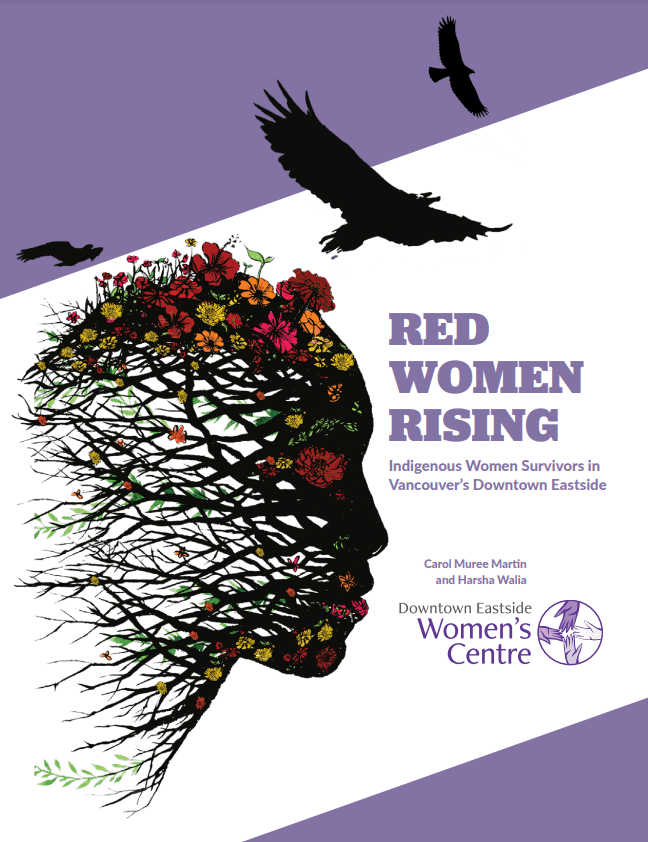23 search results
for
Education and employment
Eliminating structural violence against Indigenous women and girls
Recommendation 3: Increased state enforcement alone cannot eliminate violence against Indigenous women and girls because structural violence is connected to individual acts of male violence. A comprehensive national-level integrated action plan to eliminate violence against Indigenous women and girls must address all the socio-economic factors impacting Indigenous women’s, girls’, trans and two-spirit’s safety including equitable access and self-determination over land, culture, language, housing, child care, income security, employment, education, and physical, mental, sexual and spiritual health.-
Category and theme:
Audience:
Groups affected:
Location of recommendation:
Immediate services needed in the DTES
Recommendation 16: At least one multipurpose Indigenous Women’s Centre in the DTES that is run by and for Indigenous women with long-term funding and wrap-around supports including healing support, communal kitchen, child care facility, elder accompaniment, artisan training and vending, and 24/7 educational, cultural, recreational, and empowerment-based programming to bring Indigenous women together collectively. This would also serve as a single point of access to connect to integrated services.-
Category and theme:
Audience:
Groups affected:
Location of recommendation:
Immediate services needed in the DTES
Recommendation 27: Create a diversity of low-barrier, peer-based jobs in the DTES with priority hiring and support for Indigenous women of the community. Ensure that peer workers are paid a living wage, have full benefits, and the right to unionization. Recognize the contribution of volunteers and create appropriate and accredited volunteer programs to transfer skills and enable access to employment.-
Category and theme:
Audience:
Groups affected:
Location of recommendation:
Guaranteed public services
Recommendation 35: Provide free tuition for all postsecondary education for all Indigenous women and girls, and eliminate all existing student loans for Indigenous women and girls.-
Category and theme:
Groups affected:
Location of recommendation:
Recommendations to end Indigenous women’s displacement from land
Recommendation 37: All Canadian and Aboriginal governments must ensure that Indigenous women are engaged fully and have equitable access to decision-making on issues of governance, land, culture, language, housing, child care, income security, employment, education, health, and other areas impacting Indigenous women.-
Category and theme:
- Culture and language ,
- Decolonization and Indigenous rights ,
- Discrimination and hate ,
- Economic inequality ,
- Education and employment ,
- Health, wellness and services ,
- Indigenous children and youth in care ,
- Indigenous rights and self-governance ,
- Poverty and economic inequality ,
- Public services ,
- Representation and leadership ,
- Sexism
Audience:
Groups affected:
Location of recommendation:
Recommendations to end Indigenous women’s displacement from land
On reserve
Recommendation 45: The federal government must eliminate the discrepancy in federal education funding for First Nations children being educated on reserve and First Nations children being educated off reserve, and provide sufficient funding to close educational attainment gaps.-
Category and theme:
Audience:
Groups affected:
Location of recommendation:
Recommendations to end Indigenous women’s displacement from land
Band councils
Recommendation 51: Aboriginal governments should increase funding for education and programs regarding violence prevention directed at children, youth, and adults with an emphasis on consent, sexual education, and healthy relationships.-
Category and theme:
Groups affected:
Location of recommendation:
Recommendations to guarantee economic security for Indigenous women in the DTES
Provincial income assistance
Recommendation 70: Allow recipients of income assistance to remain on income assistance while attending postsecondary education.-
Category and theme:
Audience:
Groups affected:
Location of recommendation:
Recommendations to guarantee economic security for Indigenous women in the DTES
Provincial income assistance
Recommendation 72: Remove the age cap and the two-year eligibility requirement for income assistance for the Tuition Waiver Program for youth aging out of care.-
Category and theme:
Audience:
Groups affected:
Location of recommendation:
Recommendations to guarantee economic security for Indigenous women in the DTES
Employment security
Recommendation 76: Free skills training, retraining, and apprenticeships for Indigenous women in the DTES.-
Category and theme:
Audience:
Groups affected:
Location of recommendation:
